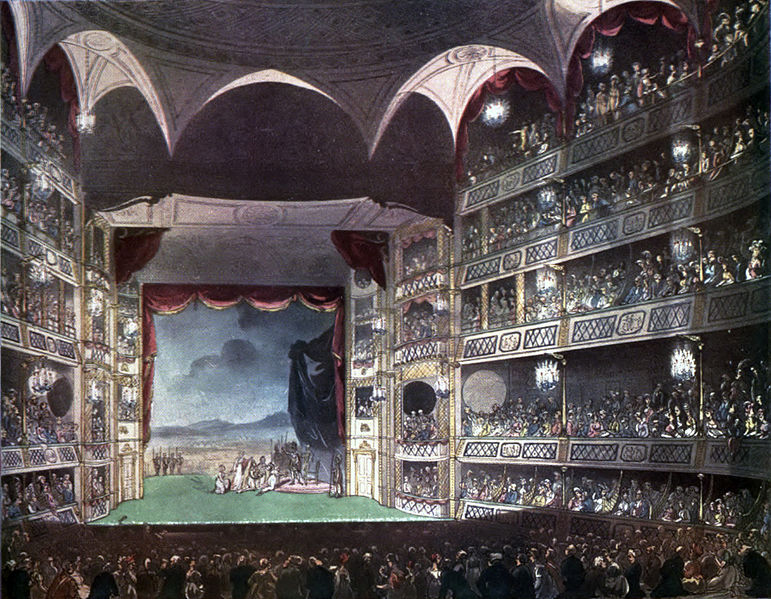
When the Drury Lane theater was closed in 1709, Joseph Addison published a fanciful list of the properties for sale:
- Spirits of right Nantz brandy, for lambent flames and apparitions.
- Three bottles and a half of lightning.
- One shower of snow in the whitest French paper.
- Two showers of a browner sort.
- A sea, consisting of a dozen large waves; the tenth bigger than ordinary, and a little damaged.
- A dozen and a half of clouds, trimmed with black, and well-conditioned.
- A rainbow, a little faded.
- A set of clouds after the French mode, streaked with lightning, and furbelowed.
- A new moon, something decayed.
- A pint of the finest Spanish wash, being all that is left out of two hogsheads sent over last winter.
- A coach very finely gilt, and little used, with a pair of dragons, to be sold cheap.
- A setting-sun, a pennyworth.
- An imperial mantle made for Cyrus the Great, and worn by Julius Caesar, Bajazet, King Harry the Eighth, and Signor Valentini.
- A basket-hilted sword, very convenient to carry milk in.
- Roxana’s night-gown.
- Othello’s handkerchief.
- The imperial robes of Xerxes, never worn but once.
- A wild boar, killed by Mrs. Tofts and Dioclesian.
- A serpent to sting Cleopatra.
- A mustard-bowl to make thunder with.
- Another of a bigger sort, by Mr. D—-s’s directions, little used.
- Six elbow-chairs, very expert in country dances, with six flower-pots for their partners.
- The whiskers of a Turkish Bassa.
- The complexion of a murderer in a band-box; consisting of a large piece of burnt cork, and a coal-black peruke.
- A suit of clothes for a ghost, viz. a bloody shirt, a doublet curiously pinked, and a coat with three great eyelet-holes upon the breast.
- A bale of red Spanish wool.
- Modern plots, commonly known by the name of trapdoors, ladders of ropes, vizard-masks, and tables with broad carpets over them.
- Three oak-cudgels, with one of crab-tree; all bought for the use of Mr. Penkethman.
- Materials for dancing; as masks, castanets, and a ladder of ten rounds.
- Aurengezebe’s scymitar, made by Will. Brown in Piccadilly.
- A plume of feathers, never used but by Œdipus and the Earl of Essex.
“Mr. D—-” is John Dennis, a critic. Elsewhere Addison wrote, “If we may believe our logicians, man is distinguished from all other creatures by the faculty of laughter.”
